This post may contain affiliate links. Please read our disclosure policy.
This delicious and authentic Pozole Rojo recipe is the ultimate Mexican comfort food! This Mexican stew features ultra-tender pork and hominy cooked in a rich red chile broth made from dried chiles and features simple but delicious Mexican flavors. Don’t forget to top your bowl with plenty of shredded cabbage, radishes, cilantro, and lime juice.
If you love this traditional Mexican dish, then you’ve got to try these other versions – pozole verde, pozole blanco, and Instant Pot pozole!

Why I Love This Pozole Recipe!
There are a handful of recipes that bring me instant nostalgia, and pozole rojo is one of them.
My family usually makes it around the holidays, alternating between Christmas one year and New Year’s the next. It’s great for feeding a crowd since most of the magic is letting the juicy pork simmer for a few hours in a rich red chile broth, and it’s just so comforting that it’s perfect for that time of year.
Each family has their own variation, but mine likes to add a special ingredient of a small tablet of Mexican chocolate to the red chile broth for extra layers of rich and warm flavor.
Here’s why I love this recipe pozole recipe so much:
- Rich flavor: The deep, earthy taste of the red chilies used in the broth gives pozole rojo its distinctive, rich, and succulent flavor that’s both spicy and savory.
- Hearty and satisfying: Made with tender pork or beef and hominy, this stew is incredibly filling and comforting, perfect for a hearty meal. My family usually makes it with pork, but you could use beef if you prefer.
- Customizable: You can tailor the spice level to your taste by adjusting the amount of chili peppers or using different types. It’s also delicious with various toppings like shredded cabbage, radishes, lime, and avocado.
What Is Pozole?
Pozole is a traditional Mexican soup or stew made with tender meat and hominy in a savory broth. It’s served year-round but is often eaten at celebrations such as birthdays, weddings, Christmas, New Year’s, and other holidays.
There are many variations of the dish, including some with a red chile broth (known as pozole rojo) and some with a green chile broth (or pozole verde). There’s even a version made with no chiles at all called pozole blanco! All variations are made with hominy and are served with lots of toppings that are meant to be mixed into each individual serving.
Ingredients in Pozole Rojo
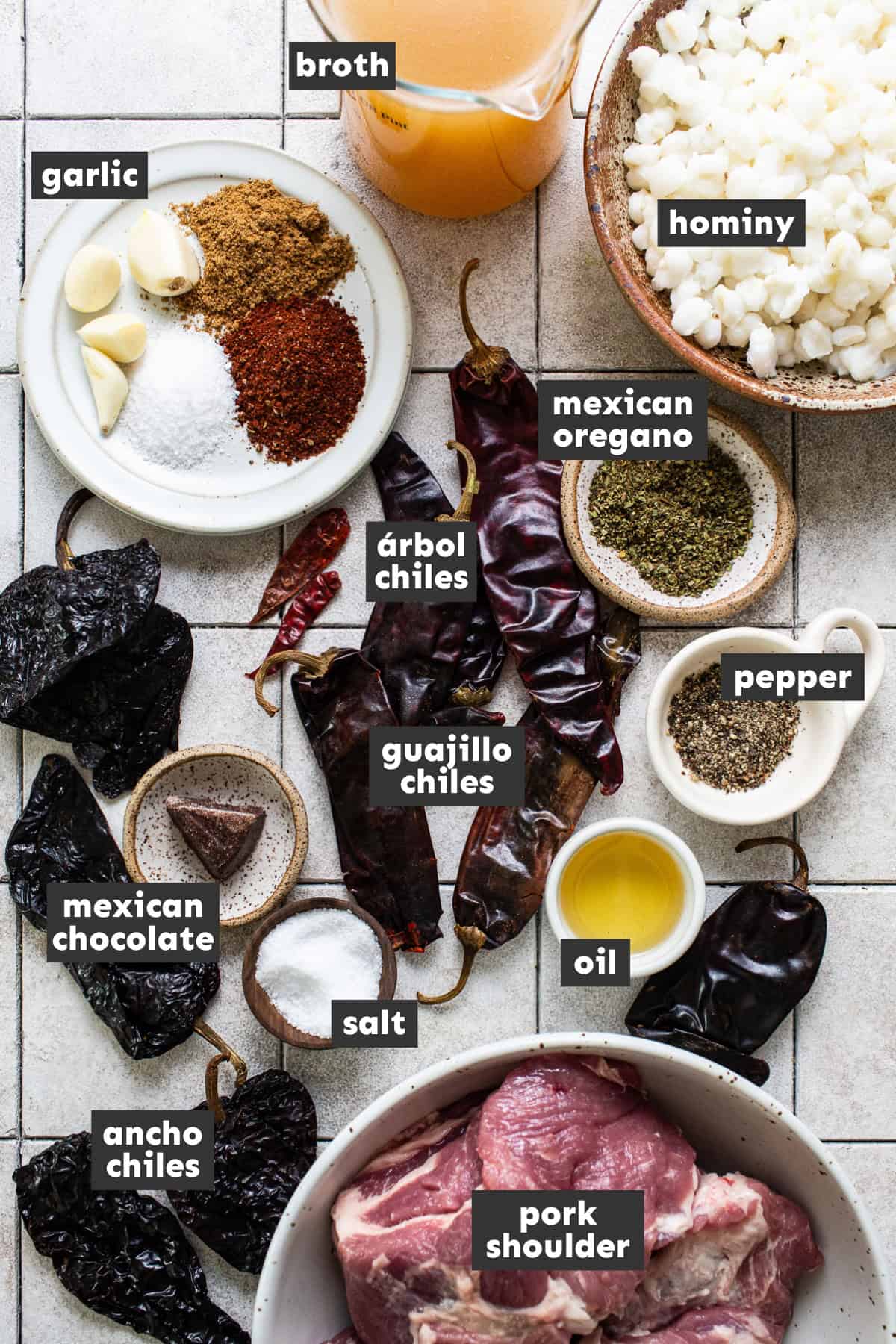
- Dried chiles: You’ll need a mix of guajillo chiles, ancho chiles, and árbol chiles. You can find them in the Hispanic foods aisle of many large grocery stores or a specialty Mexican grocer. If you can’t find them in your area, buying them online is always a great option.
- Hominy: This is often found in the Hispanic foods aisle of your local grocery store or sometimes near the canned corn. If you’ve never used it before, hominy is a type of maize that’s been soaked and treated with lime. The kernels are about triple the size of yellow corn, and they add great maize flavor and texture. I usually use white hominy, but you can also use yellow hominy.
- Pork shoulder: Also known as “pork butt,” this cut of meat is perfect for pozole because it’s super tender, juicy, and shreds easily.
- Broth: I prefer using broth for added flavor. You can use vegetable, chicken, or beef. If you don’t have broth, water will also work in a pinch.
- Spices: Cumin, chili powder, Mexican oregano, salt, black pepper, and garlic add layers of Mexican flavor.
- Mexican chocolate (optional): This ingredient is optional, but I find that Mexican chocolate adds a little extra depth of flavor that compliments the chiles. It doesn’t make the chile sauce sweet at all. I used Abuelita Mexican chocolate, but you can use any Mexican chocolate you prefer. If you can’t find anything near you, you can find some online.
How to Make Pozole Rojo
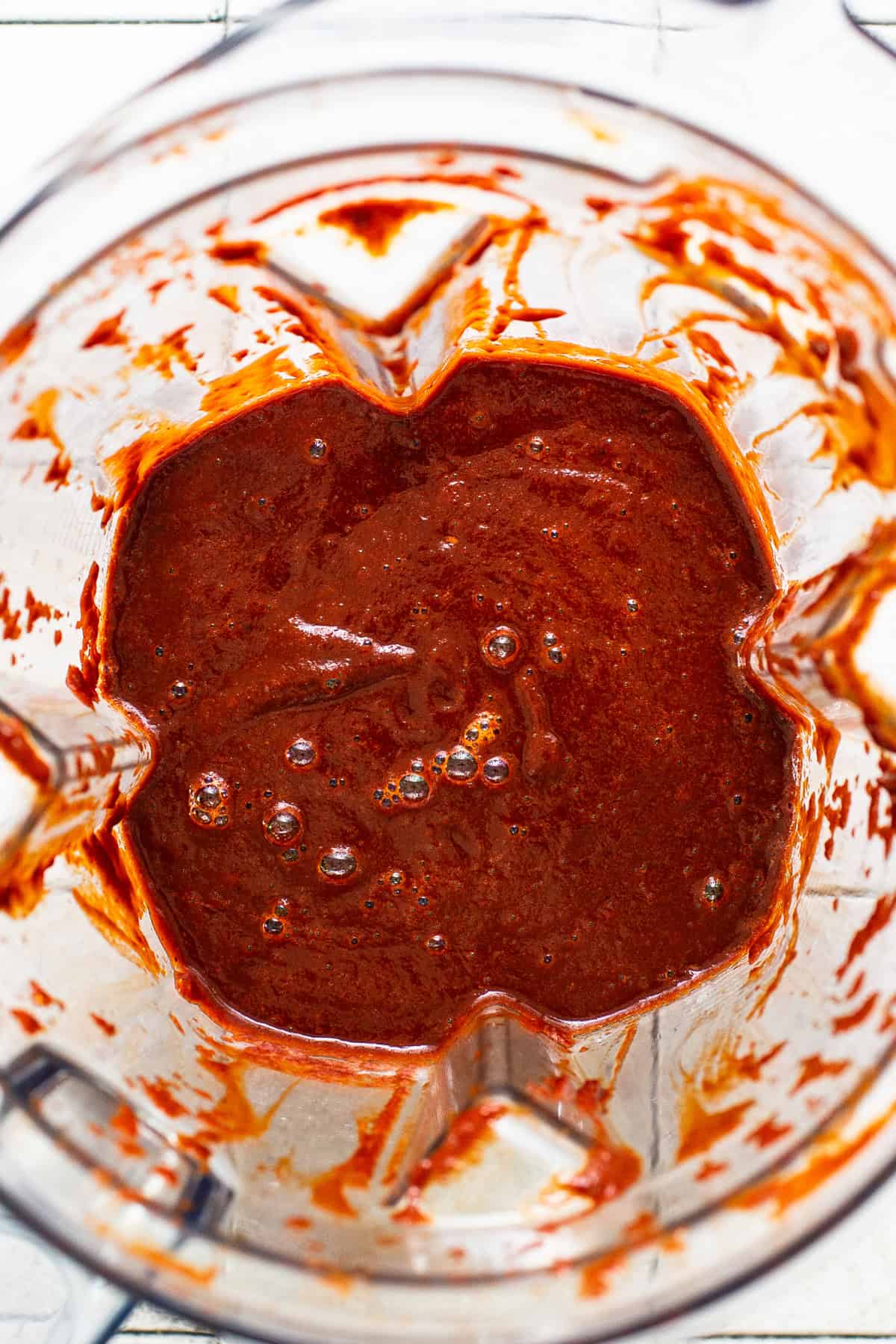
Make the chile broth: Add the water and the guajillo, ancho, and árbol chiles to a medium pot. Bring to a boil over high heat, cover, remove from heat, and let soak for 15 minutes. Carefully transfer them and the hot water to a large blender. Add the chili powder, ground cumin, salt, garlic, and Mexican chocolate. Blend for 2-3 minutes until completely smooth. Set aside.
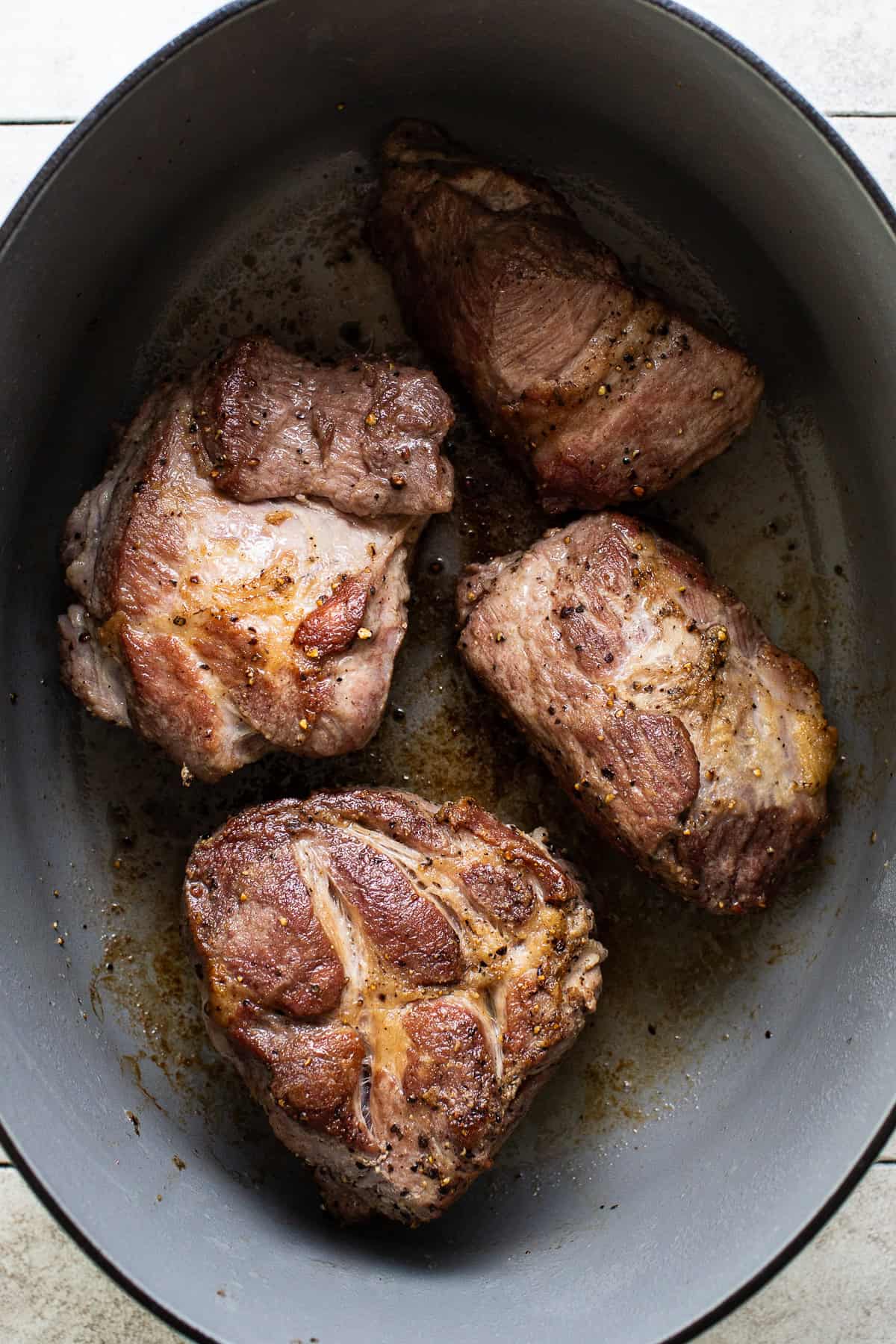
Sear the meat: Season all sides of the meat with the salt and black pepper. Heat the oil in a large pot or Dutch oven over medium-high heat. Add the pork, and sear the meat on all sides until nicely browned.
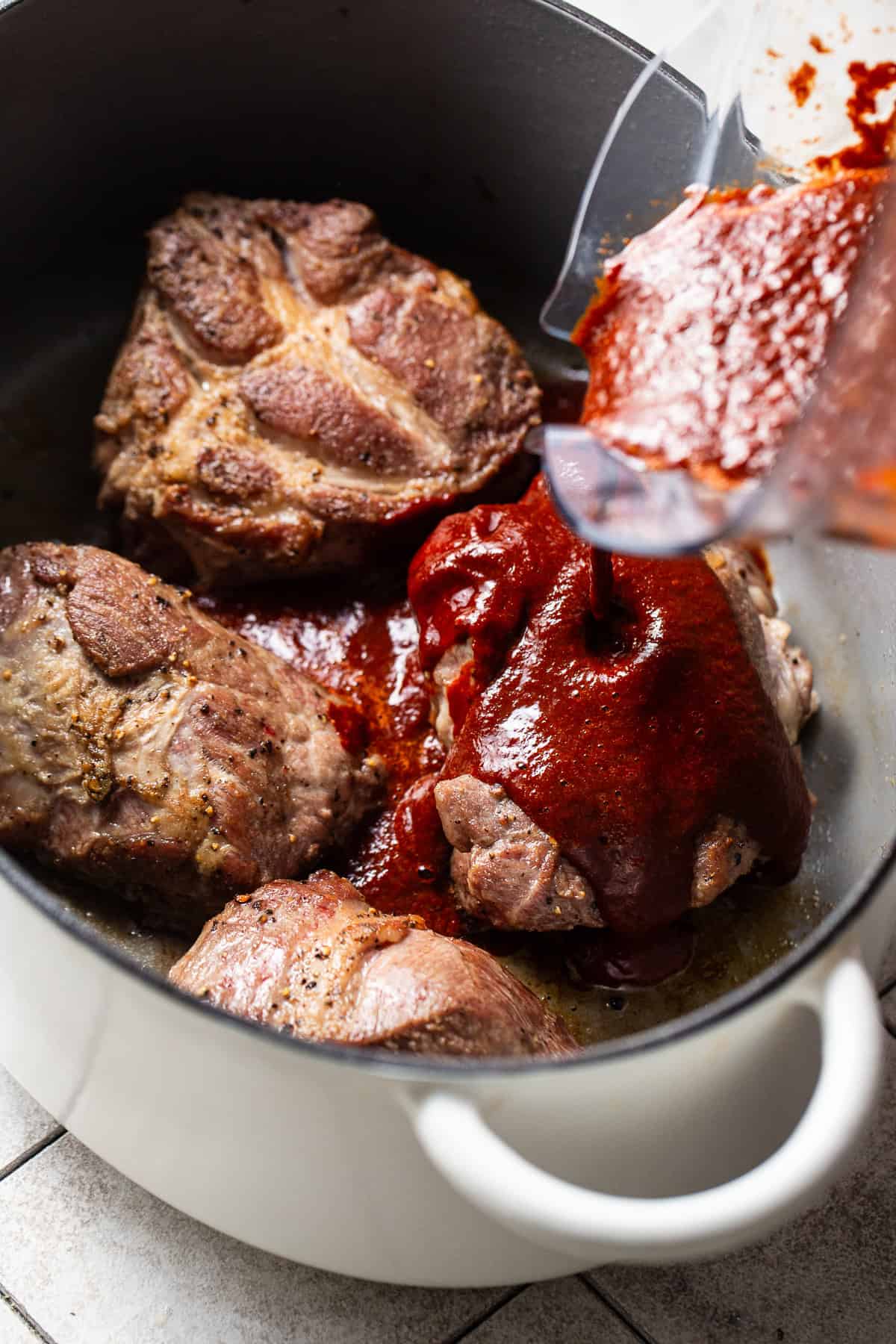
Combine and cook: Pour in the red chile broth and scrape the bottom of the pot with a wooden spoon to loosen all the brown bits. Stir in the broth, hominy, and dried oregano. Bring to a boil, reduce the heat to a low, cover, and simmer for 2 ½ hours until the pork is fall-apart tender.
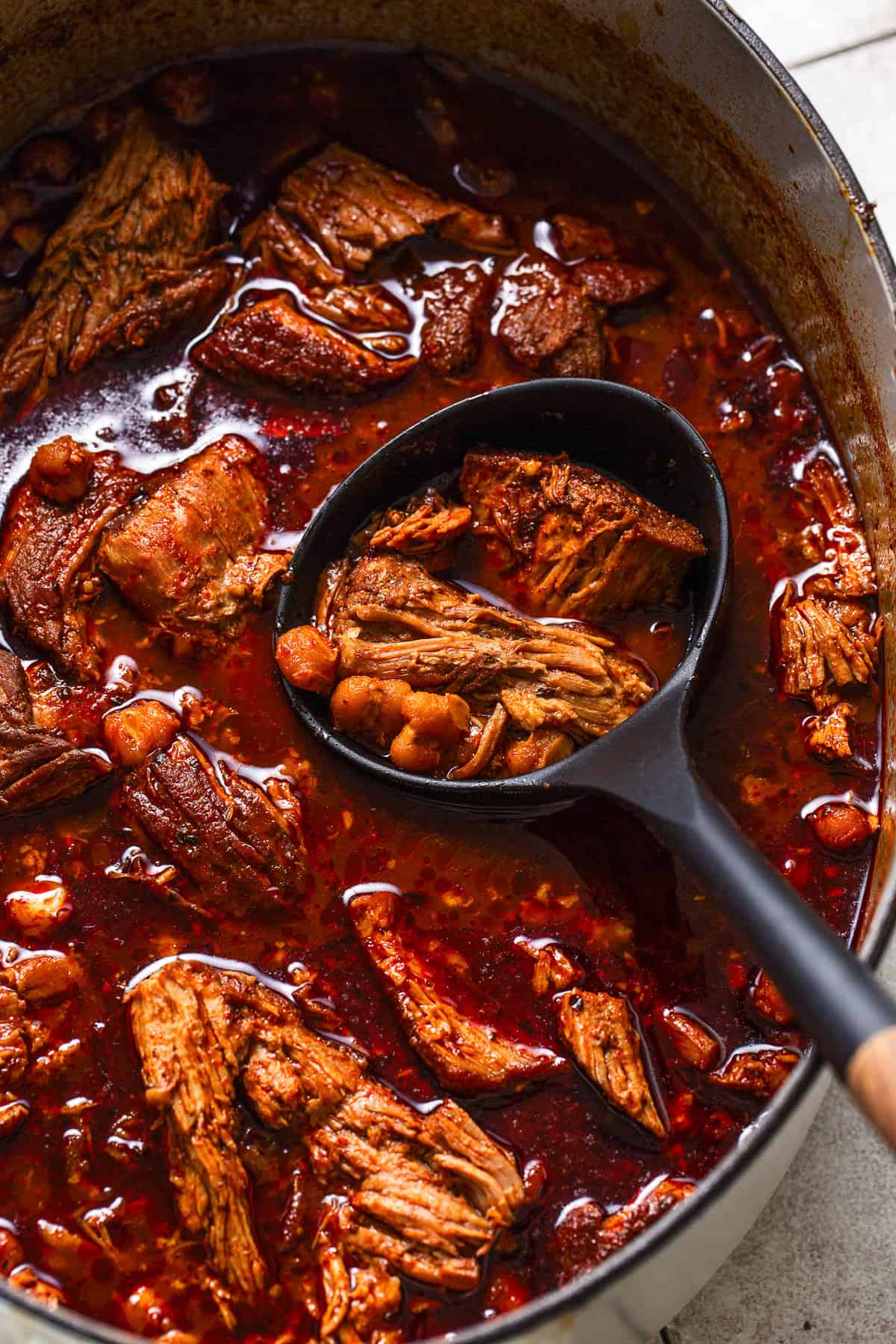
Shred: Shred the pork with a fork or tongs (it should fall apart very easily). Taste and season with more salt, if necessary. If the pozole isn’t brothy enough for you, you can also mix in a little more water or broth at this point.
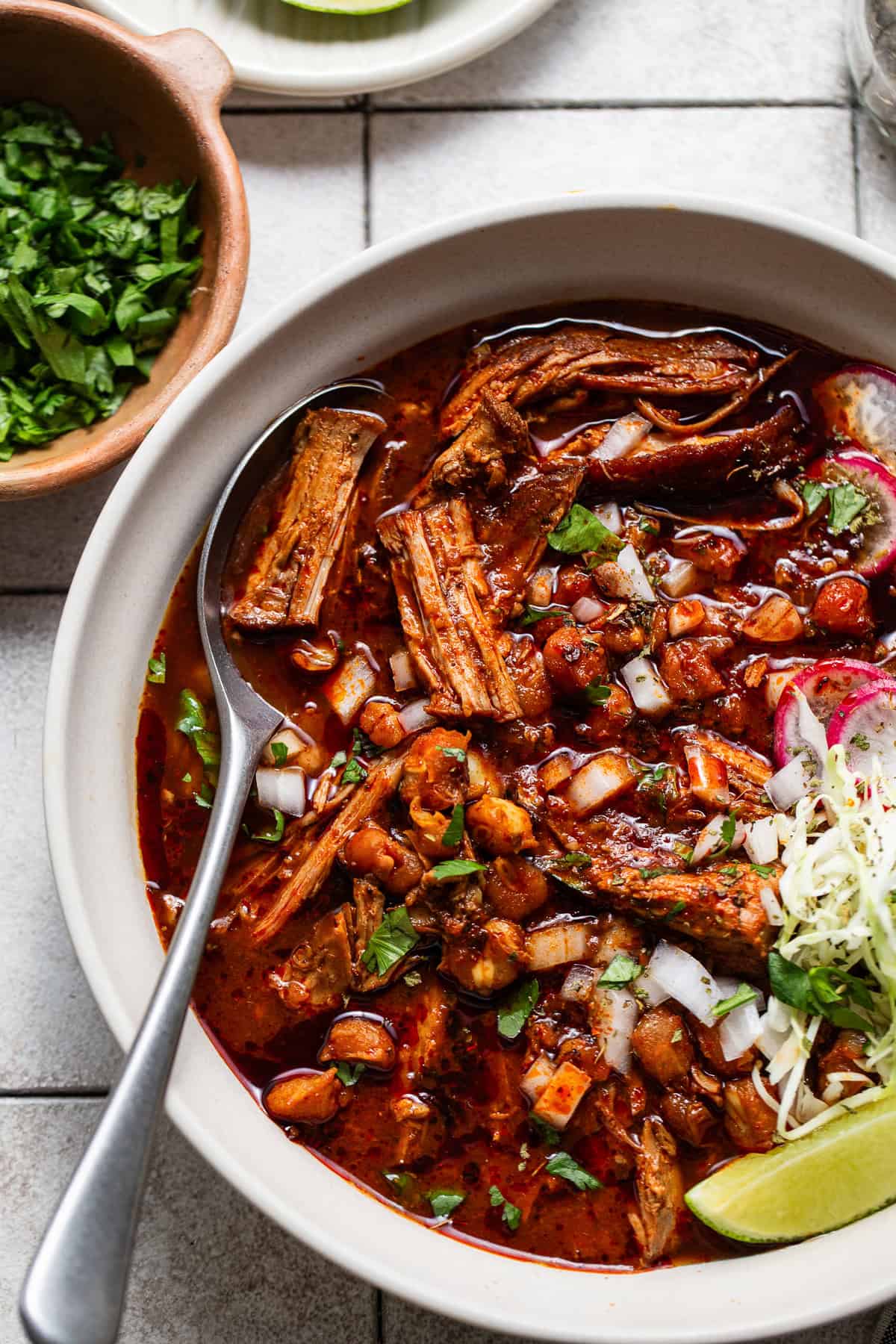
Serve: Top with thinly shredded cabbage, cilantro, lime juice, sliced radishes, diced onions, and dried Mexican oregano.
Recipe Tips
- Swap the protein. You can use beef chuck roast instead of pork shoulder. Treat it exactly the same by searing it first, then braising it in the broth.
- Use the right chiles. You can find dried chiles in the Hispanic foods aisle of your local grocery store or a specialty Mexican grocer. If you can’t find them in your area, you can easily buy them online.
- Customize the spice: Omit the árbol chiles for a milder heat, or add in a couple more for a spicy stew.
- Not enough broth? Some people love their pozole extra brothy. If you find that the pozole isn’t soupy enough for you, stir in some more broth at the end until it’s to your desired consistency.
Serving Suggestions
A comforting bowl of pozole rojo is delicious and filling on its own, but you wouldn’t captivate the full authentic experience without all the delicious toppings. Here are some traditional toppings that are served with pozole:
- Thinly shredded cabbage
- Chopped cilantro
- Dried Mexican oregano
- Freshly squeezed lime juice
- Thinly sliced radishes
- Diced white onions
Instant Pot and Slow Cooker Methods
To make pozole in the Instant Pot, use the ‘Saute’ function to sear the meat, then add in the blended chile sauce, broth, hominy, and Mexican oregano. Close the lid and pressure cook on high for 60 minutes using the manual setting. Let the pressure release naturally for 10 minutes before manually releasing any remaining pressure.
To make pozole in the slow cooker, sear the meat in a large skillet, then transfer to the slow cooker. Add the blended chile sauce, broth, hominy, and Mexican oregano, and slow cook on low for 6-8 hours or on high for 4-5 hours until the pork is tender and easily shreddable.
Storing and Reheating
- Storing: Allow the pozole to cool, then transfer to an airtight container and refrigerate for up to 4 days. Keep any fresh toppings, like cabbage or radishes, in separate containers.
- Freezing: Portion pozole into freezer-safe containers or bags, leaving space at the top to allow for expansion. Freeze for up to 3 months for the best flavor.
- Reheating: For refrigerated pozole, reheat it on the stovetop over medium heat or in the microwave in increments, stirring it in between. If frozen, thaw in the refrigerator overnight, then reheat, or reheat directly from frozen over low heat on the stovetop, adding a bit of broth if needed. Add fresh toppings just before serving.
More Mexican Recipes
If you tried this Pozole Rojo Recipe or any other recipe on Isabel Eats, don’t forget to rate the recipe and let me know how it went in the comments below! I love hearing about your experience making it!

Pozole Rojo
Ingredients
For the broth
- 4 cups water, divided
- 6 guajillo chiles, rinsed and seeded
- 4 ancho chiles, rinsed and seeded
- 2 árbol chiles, rinsed (seeds removed if you prefer a mild spice level)
- 1 tablespoon chili powder
- 2 teaspoons ground cumin
- 1 ½ teaspoon kosher salt
- 4 cloves garlic
- 8 grams Mexican chocolate, optional (about ⅛ disc)
For the stew
- 2 ½ pounds pork shoulder, cut into large 4-inch chunks
- 1 tablespoon kosher salt
- 1 teaspoon freshly ground black pepper
- 2 tablespoons oil
- 6 cups broth (chicken, vegetable, or beef)
- 3 (15-ounce) cans white hominy, drained and rinsed
- 1 tablespoon dried Mexican oregano
Suggested toppings
- thinly shredded cabbage, cilantro, diced onions, lime wedges, sliced radishes, Mexican oregano
Instructions
- Make the chile sauce: Add 3 cups of water and the guajillo, ancho, and árbol chiles to a medium pot. Bring to a boil over high heat, cover, remove from heat, and let soak for 15 minutes.
- Carefully transfer the softened chiles and the hot water to a large blender. Add the remaining fresh water, the chili powder, ground cumin, salt, garlic, and Mexican chocolate. Blend for 2-3 minutes until completely smooth. Set aside.
- Prepare the meat: Season all sides of the pork with the salt and black pepper. Heat the oil in a large pot or Dutch oven over medium-high heat. Add the pork, and sear the meat on all sides until nicely browned.
- Combine and cook: Pour in the red chile sauce and scrape the bottom of the pot with a wooden spoon to loosen all the brown bits. Stir in the broth, hominy, and dried oregano.
- Bring the pot to a boil, reduce the heat to a low, cover, and simmer for 2 ½ hours until the pork is fall-apart tender.
- Shred the pork with a fork or tongs (it should fall apart very easily). Taste and season with more salt, if necessary.
- Serve with toppings such as thinly shredded cabbage, cilantro, lime juice, sliced radishes, diced onions, and dried Mexican oregano.
Notes
- Mexican chocolate: This ingredient is optional, but I find that it adds a little extra depth of flavor that compliments the chiles. It doesn’t make the chile sauce sweet at all.
- Swap the protein: You can use beef chuck roast instead of pork shoulder. Treat it exactly the same by searing it first, then braising it in the broth.
- Use the right chiles: You can find dried chiles in the Hispanic foods aisle of your local grocery store or a specialty Mexican grocer. If you can’t find them in your area, you can easily buy them online.
- Customize the spice: Omit the árbol chiles for a milder heat, or add in a couple more for a spicy stew.
- Not enough broth? Some people love their pozole extra brothy. If you find that the pozole isn’t soupy enough for you, stir in some more broth at the end until it’s to your desired consistency.
Nutrition
Nutrition information is automatically calculated, so should only be used as an approximation.
The recipe was originally published in December 2018 and has been updated with more helpful tips and new photos.
Photography by Ashley McLaughlin.


















Loved this recipe. I added a cinnamon stick for a half hour at the end and enjoyed the flavor it added.
Hi Kat! We’ve never thought of that, that’s a great tip!
In making the #ChileRoja, after using the bender, why don’t you run it through a sieve?
Lived in Chihuahua, México for 16 years & haven’t made #ChileRoja since my return!! Someone asked me for a couple dishes & Pozole has always been my favorite dish!! So this will be a treat not only for my Uncle, but myself as well 🙂
Only few things are different: sieve, only used 1 type of chile (California) and the hominy is a raw bean (cooked out of bag). I will follow your directions, the change’s are super minimal ~
Only a few things are a MUST, if I’m gonna call it Pozole: shredded cabbage, radishes, & onion!! And ofc, for those that need more, a side of algo picante!! 🔥
I appreciate the recipe’s! Been stateside again for 20+ years and the only recipes I remember w/out straining the old noggin, are Albóndigas & Caldillo 🙂
If I can only remember 2 recipes, these are 2 good ones to remember‼️
I’ll let you know how the sublime changes did, within a couple weeks
Ty, Lynne
Hi Lynne! Thank you for sharing! We hope you enjoyed this recipe. In regards to your question, that step it definitely optional! If you still have chunks in your chile roja then we suggest running it through a strainer, but if it blends smooth you don’t have to!
Isabel, I am from New Mexico. We do not use hominy, but what we call posole corn. It is not a mushy as canned hominy. It is similar, but has more chewy texture and holds its shape more. It comes either frozen or dried. It has gone through the nixtamalization process, but perhaps for not as long.
I have only had canned hominy, so the homemade version may be very different.
Traditionally NM posole is made with pork (I use pork neck bones that add a lovely gelanteous to the liquid) and New Mexico chile colorado, which is made using NM red chile (not the same as chile colorado in Mexican cuisine). I top with chopped onion and/or some grated cheese. We eat this with a flour tortilla, sopapilla (puffed fried dough), fry bread (made by most US Native American women- it is a fried flour dough) or warmed/toasted oven bread (this is bread that Pueblo Indian women make and cook in outdoor adobe ovens called hornos).
That sounds great! Thank you for sharing!
We had this tonight. Delicious. Thanks.
Thank you Don!
OMG….I’m Mexican and am very picky when it comes to posole. This by far is the best posole i have tried in a long time. Kudos to you Isabel. Now i want to try some of your other recipes. Keep up the good cooking.
Thank you Mickey!
I found your recipe the light my husband. He makes Chile Colorado with tour recipe! I made posole on Christmas and let me tell you it was a hit! Everyone loved it! Thanks for sharing your recipes!
**I found your recipes through my husband.
I am not usually a huge reviewer, but I’ve made this recipe two years in a row and it’s been delicious both times. Thank you so much for sharing, definitely becoming a household staple around Christmas time 🙂
Who knew it was so easy to make at home? Delicious! I love your recipes!
Love! I have made it twice and will be making again for my son over Christmas. The thinly sliced radishes and cabbage give it a perfect crispness.
I have made this twice and love, love, love! I actually used all of the suggested toppings and was very surprised that I loved the thinly sliced radishes. Who knew I liked radishes. Lol It gave it a nice, added crispness. The recipe is delicious just as it is.